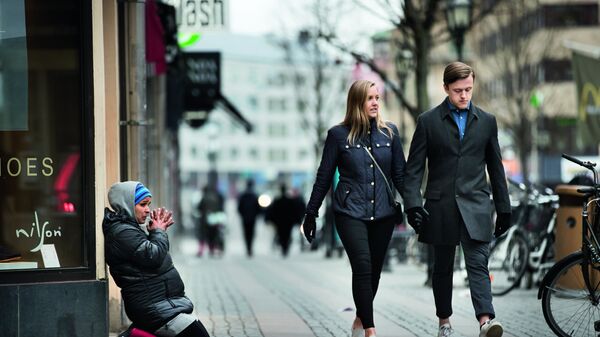As the Swedish Foreign Ministry decided to discourage all travel, Löfven stressed that the Swedish government has not yet considered closing Sweden's borders. The country's school also remain open, unlike in neighbouring states.
In his recent speech about the spread of the coronavirus, Swedish Prime Minister Stefan Löfven called the coming weeks and months “crucial”.
“The decisive factor is that the pace of development is slowing down. The opposite, a rapid process with a large spike in the number of seriously ill people, can become overwhelming for the health care system”, Löfven explained to national broadcaster SVT.
While many EU countries and Sweden's immediate neighbours, including Denmark, Norway, and even Germany chose to lock down their frontiers to prevent the spread of the coronavirus, Löfven reiterated the advice from before: stay home if you are ill, refrain from visiting the sick and the elderly, and maintain good hand hygiene.
Anders Tegnell, state epidemiologist at the country's Public Health Agency, concurred that the spread of the coronavirus in Sweden is still at an early stage and that it can still be contained if the public follows the general advice of staying home if sick and working from home whenever possible.
Once again, Tegnell rejected the benefits of drastic measures that other countries around Europe are now taking, such as closing borders, restaurants and shops, and imposing strict meeting restrictions.
“We have to remember that this is nothing we should do today or tomorrow. This is something is likely to continue for months to come. Therefore, we must have something that is sustainable, we just cannot have everything for several months in a row”, Tegnell told Swedish Radio, predicting that these measures “won't work” in other countries.
Sweden also digressed from its neighbours in keeping schools open. The Public Health Authority has so far cited infection protection and social reasons: if the children are not in school, the parents don't know their whereabouts, plus there is risk that children will infect older relatives.
Stating a “social spread” of the virus, which no longer can be traced to travellers, Tegnell stressed the importance of isolating the most vulnerable groups, such as the elderly. Tegnell also suggested that the high death toll in Italy, over 2,000, was about failing to protect older citizens in time.
Earlier this month, Sweden dropped the exact count of the infected and made tests available only for hospital staff and at-risk groups.
“Now it is no longer important to know exactly how many people are infected in Sweden”, Tegnell told the daily Aftonbladet. “We will no longer discuss whether we have, say, 458 or 562 cases. But instead how large parts of Sweden are affected and how hard hit they are”, Tegnell explained.
Former state epidemiologist Annika Linde said she had the impression that the Swedish strategy is for the country to achieve “herd immunity”.
“I believe that the strategy of the Public Health Authority is that we should achieve herd immunity, that as many people as possible should be infected and thereby become immune, without being seriously ill”, Linde told SVT.
Sweden's chief epidemiologist Anders Tegnell admitted that the strategy of building up “herd immunity” is “partially correct”.
“Our main purpose now is to slow down the spread of infection as much as possible, and of course in the long term build up some kind of immunity in society that prevents it from spreading so quickly in the future”, Anders Tegnell said.
So far, Sweden has recorded seven deaths, all reportedly elderly patients with previous medical records.
The proportion of the population that needs to be vaccinated and/or acquire immunity for herd immunity varies between different diseases from 80 to 95 percent.
The coronavirus outbreak, recently upgraded to a pandemic by the World Health Organisation, has infected over 182,000 people in over 100 countries, with over 7,100 deaths and almost 80,000 patients successfully recovered.




